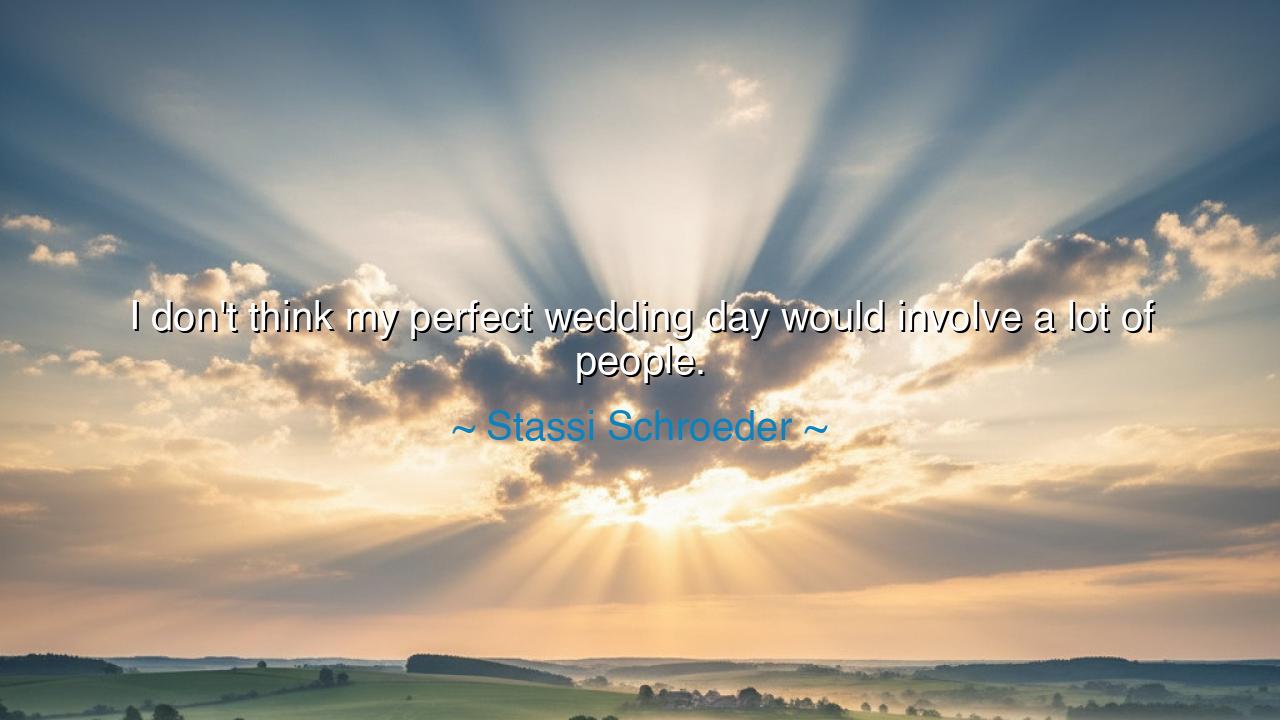
I don't think my perfect wedding day would involve a lot of






In this quiet yet profound reflection, Stassi Schroeder speaks of the intimacy of love and the sacredness of personal union. By saying, “I don't think my perfect wedding day would involve a lot of people,” she rejects the modern expectation that a wedding must be a grand spectacle filled with crowds and noise. Instead, she envisions a day of simplicity and closeness, where the focus remains on the bond between two souls rather than the demands of an audience. Her words carry the wisdom of one who values authenticity over display, reminding us that love shines brightest when it is undistracted.
The perfect wedding day, in Stassi’s vision, is not about impressing others but about creating a space of true connection. Throughout history, weddings have often been communal affairs, serving as displays of wealth, alliances, or social standing. Kings and queens once married before thousands to secure empires, while village weddings brought entire communities together to witness the binding of families. Yet Stassi’s perspective reminds us of another truth: that at its heart, marriage is a deeply personal covenant, requiring no grand stage, only two hearts willing to unite in fidelity and trust.
Her sentiment finds resonance in many spiritual traditions. In ancient times, secret weddings were often held to protect the sanctity of love from political interference or societal judgment. One famous example is the story of Marcus Aurelius, the Roman emperor, who arranged private ceremonies for soldiers and their beloveds so that their unions would not be tainted by the politics of the imperial court. These quiet ceremonies carried profound meaning precisely because they focused on the individuals, not the spectacle. Like these hidden vows of the past, Stassi’s vision reflects a desire for purity and focus on what truly matters.
There is also a profound humility in her words. A wedding with fewer people allows for genuine presence, where every guest bears witness not as a casual observer but as a guardian of the couple’s journey. In contrast, large, impersonal gatherings can turn sacred vows into performances, where the meaning is lost amid glitter and noise. Stassi’s choice reflects the ancient wisdom that the most sacred moments are often those shielded from the eyes of the world, like seeds planted in secret soil, growing strong in silence before they bloom.
Thus, her reflection becomes a timeless teaching for future generations: celebrate love according to your heart, not the expectations of others. Whether witnessed by thousands or by only a few, a wedding’s true perfection lies not in numbers, but in sincerity. For when love is honored in its purest form, even a quiet room can feel as vast and eternal as the heavens. In this way, Stassi’s vision calls us to return to the essence of union — a sacred promise shared not for the world’s applause, but for the eternal bond between two souls.






AVNGOC ANH Vu
It’s interesting to think about how Stassi Schroeder envisions a perfect wedding day with fewer people. Could it be that today’s weddings have become a social expectation rather than a personal milestone? How would weddings change if we focused more on the couple’s desires rather than societal norms? Could the desire for a smaller celebration indicate a shift toward more meaningful, personal connections over extravagant displays?
MKHa Minh Khoi
Stassi’s preference for a smaller, more intimate wedding got me thinking: Do big weddings sometimes lose sight of what truly matters to the couple? In today’s world, there’s so much pressure to have a grand affair. Could a wedding with just close family and friends create a stronger sense of connection and allow for a more meaningful celebration? Would smaller weddings become the new trend?
BHDinh Le Bao Han
I totally get Stassi's view on wanting a smaller wedding. Sometimes weddings with large guest lists can become overwhelming and distract from the real reason behind the celebration. Is there a possibility that modern weddings have become too commercialized? Do we truly need a big crowd to validate the significance of the day, or could a smaller group bring out more personal moments?
KDkiet doan
I can understand why Stassi Schroeder might prefer a wedding with fewer guests. It seems like weddings can become more about appeasing others than the couple themselves. Does anyone else feel that way, where intimacy and personal connections make the experience more genuine? Could a smaller wedding lead to a more memorable and relaxed atmosphere compared to one that's filled with too many expectations?
TTThanh Thu
Stassi Schroeder's take on a perfect wedding day being intimate rather than large-scale resonates with me. It's interesting how weddings have evolved into massive events that often feel more like a performance than a personal celebration. What is it about having fewer people that makes the day feel more meaningful? Could it be that the focus is better on the couple rather than trying to please a crowd?